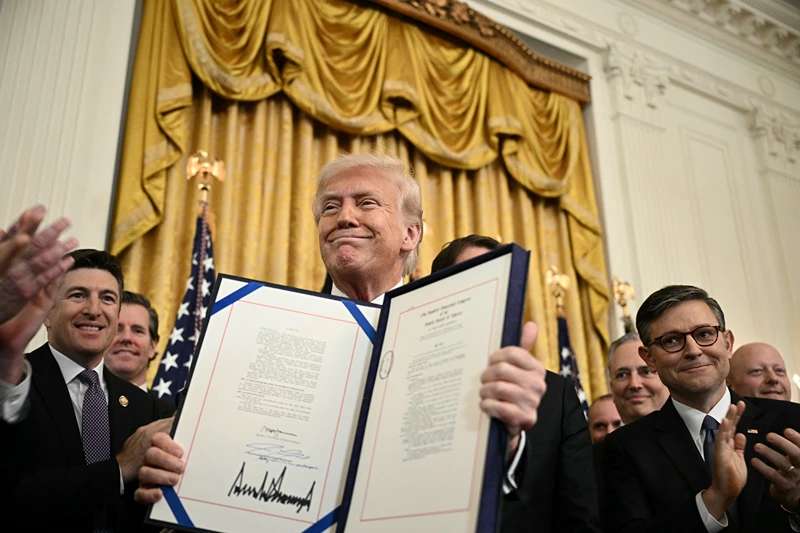
OAN Staff Abril Elfi and Brooke Mallory
4:35 PM – Friday, July 18, 2025
President Donald Trump has officially signed the Guiding and Establishing National Innovation for U.S. Stablecoins (GENIUS) Act into law.
On Friday, Trump officially signed the legislation, paving the way for a regulatory framework for payment stablecoins. This will set up rules and guidelines for how “payment stablecoins” can be regulated in the U.S.
Ahead of signing the bill, the GOP president recalled how he previously vowed to make the U.S. the “crypto capital of the planet” during a keynote address at a bitcoin conference in Nashville, Tennessee, in July 2024.
At the time, he explained that the regulations his administration would implement would be “written by people who love your industry, not hate your industry.”
“I pledged that we would bring back American liberty and leadership and make the United States the crypto capital of the world,” Trump said. “And that’s what we’ve done. And under the Trump administration, this is only going further.”
“Just as I promised last year, the GENIUS Act creates a clear and simple regulatory framework to establish and unleash the immense promise of dollar-backed stablecoin,” he said. “This could be perhaps the greatest revolution in financial technology since the birth of the internet itself.”
The GENIUS Act includes measures requiring monthly public disclosure of reserve competition, as well as annual audited financial statements for firms with market capitalizations greater than $50 billion, according to the Senate Banking Committee — which sponsored the legislation.
On Thursday, the House passed the act by a 308–122 vote, after the measure cleared the Senate in June by a 68–30 margin.
“For far too long, America’s digital assets industry has been stifled by ambiguous rules, confusing enforcement and the Biden administration’s anti-crypto crusade,” Majority Whip Tom Emmer, R-Minn., said during a press conference on Thursday. “But President Trump and this Congress are correcting course and unleashing America’s digital asset potential with historic, transformative legislation.”
The 12 Republicans who initially voted against advancing the GENIUS Act during the procedural vote:
- Andy Biggs (Ariz.)
- Tim Burchett (Tenn.)
- Michael Cloud (Texas)
- Andrew Clyde (Ga.)
- Eli Crane (Ariz.)
- Marjorie Taylor Greene (Ga.)
- Andy Harris (Md.)
- Anna Paulina Luna (Fla.)
- Scott Perry (Pa.)
- Chip Roy (Texas)
- Victoria Spartz (Ind.)
- Keith Self (Texas)
Nonetheless, after negotiations and pressure from leadership, some of these members reversed their stance. Following hours of behind-the-scenes negotiations, including promises to attach anti-CBDC language to the NDAA, eight of these Republicans switched their votes and supported the motion.
However, the ninth holdout was Rep. Marjorie Taylor Greene (R-Ga.) — holding firm against the motion. She has warned that the bill risks paving the way for a government-controlled “cashless society.”
Meanwhile, the legislation has also sparked criticism from lefty politicians such as House Financial Services Committee ranking member Rep. Maxine Waters (D-Calif.) over “conflict-of-interest concerns.”
“By passing this bill, Congress will be telling the world that Congress is OK with corruption, OK with foreign companies buying influence, and OK with criminals buying Trump coins to seek pardons and beneficial treatment,” Waters said on the House floor Thursday.
In addition to the GENIUS Act, the House passed two other cryptocurrency-related measures on Thursday: the Digital Asset Market Clarity Act (CLARITY Act), which establishes an additional regulatory framework for digital assets, and the Anti-CBDC Surveillance State Act, which aims to amend the Federal Reserve Act in restricting the Federal Reserve’s authority concerning central bank digital currencies (CBDCs) — in addition to “protecting Americans’ financial privacy.”
Stay informed! Receive breaking news blasts directly to your inbox for free. Subscribe here. https://www.oann.com/alerts
What do YOU think? Click here to jump to the comments!
Sponsored Content Below

